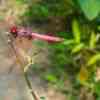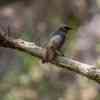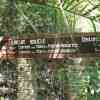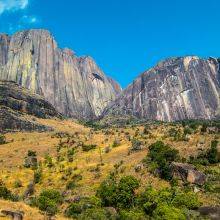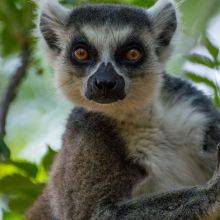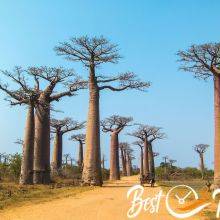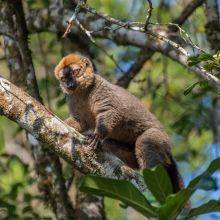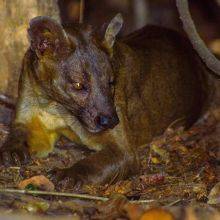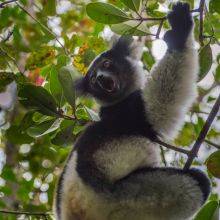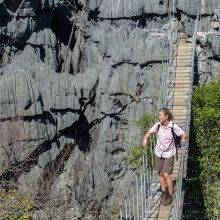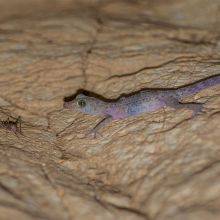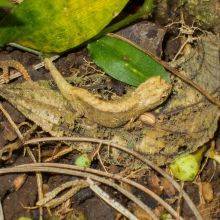When Is the Best Time
The Isalo National Park is accessible throughout the year due to its dry tropical climate. However, the winter time from December to February experiences most of the annual precipitation. The tourist season starts in April, the peak season is during summer in July and August and the best months are September and October. At these months, the end of the dry season, there are only a few mosquitos around, and you may spot newborn baby lemurs.
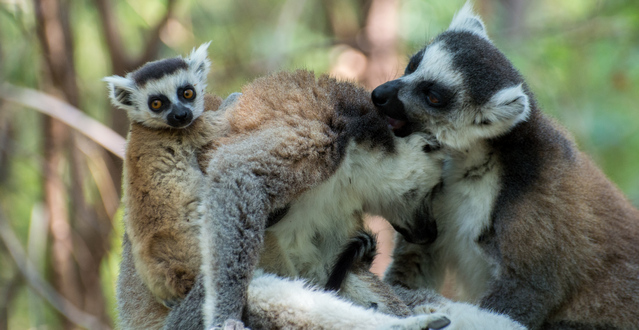
Compared to other parks wildlife is not as numerous due to the higher temperature. However, Isalo is an outstanding park to spot the awesome Verreaux’s Sifakas along the streams in the canyons.

Another highlight is the elephant’s foot plant (Pachypodium rosulatum) which is in bloom from August to early October.

The most popular spot in Isalo is the "Piscine Naturelle" therefore it can get pretty busy especially during midday to escape the heat.
Weather
The dry season lasts from April to late October, but there is not much precipitation in the southwest of Madagascar. Pleasant day temps from April to September ranging between 23°C and 28°C/74°F and 82°F though nights are chilly between 10°C to 15°C / 50°F - 59°F. The rest of the year temps are around 30°C/86°F. Inside the canyons, it's cooler while hiking through the savanna without any shelter is pretty hot and strenuous. The hottest months with higher humidity are November to March.
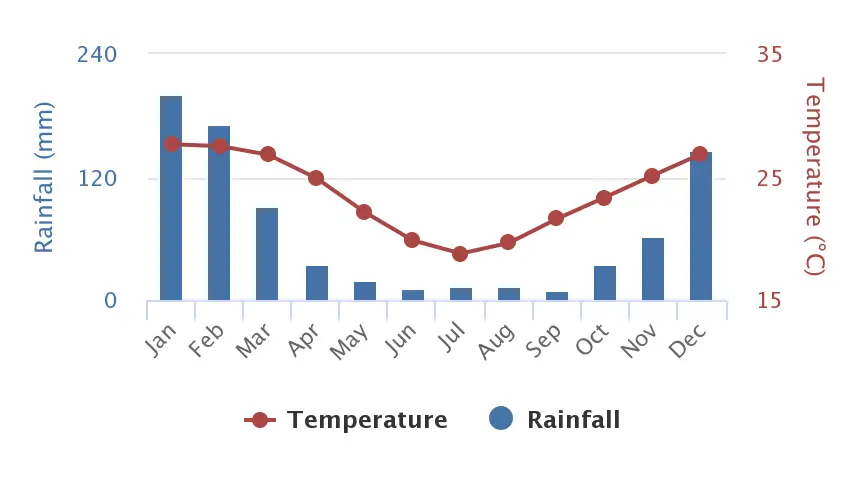
Average Monthly Temperature and Rainfall for MDG at location (-22.5,45.41) from 1991-2015; source. worldbank.org
Some of the best lodges of Madagascar are located next to the Isalo National Park entrance. Usually, the available hotels have a lower standard and rating. Advanced booking is recommended to ensure having an excellent stay.
- The Isalo Rock Lodge has truly a spectacular location; embedded into the rocky landscape. The staff is super professional and the management perfect; that is rare to experience in Madagascar.
- Le Jardin du Roy is also excellently located surrounded by huge rocks. It's an incredible view from the terrace or balcony. It's a high standard hotel with a gorgeous restaurant. Take your breakfast outside and enjoy the scenery.
Best Months to Visit
Location and Tips

The National Park was established in 1962 and covers an area of 815km²/81,500ha. Isalo is located at an altitude of 900m/2952ft to almost 1100m/3608ft. The plateau and the rocks are from the Jurassic area and build awe-inspiring scenery. You will find several hikes to waterfalls, canyons, the wild mountainous region, through some left forest patches, and along the plateau. Isalo offers incredible panoramic views of a colourful landscape mainly shaped by thousands of years of erosion from wind and rain. It's a sacred place for the Bara tribe. While hiking your guide will show you several caves in the walls which are burial sites.

You may spot the Verreaux's sifakas or ring-tailed lemurs very close. They are accustomed to humans. Isalo is also famous for local endemic plants like the elephant's foot. Flatid leaf bugs, stick insects, coloured caterpillars, and other unknown insects occur there as well. It is not easy to get an experienced and motivated guide, but you are not allowed to walk independently. The guided hikes are a bit pricey in comparison to other National Parks in Madagascar. The entrance fee for one day is Ar 25.000 (6,20 €) and Ar 37.000 for two days (9,20€).

However, if you come here, stay at least three nights and spend two full days in the park. The first day we hiked through the savanna and to the "Piscine Naturelle" and the next day to "Canyon des Makis" and "Canyon des Rats". Bring your bath clothes and take a refreshing dip in the pools.
How to Get There
The Isalo National Park is located 700km/435mi from Antananarivo which could be a 15-hour drive and from Tulear/Toliara at the west coast a 3-4 hours (230 km/ 143 mi) journey. Usually, you arrive from Andringita or Ranomafana (which is just 5.5 hours). The park is directly located at the R7. Although "taxi brousse" connecting Antananarivo and Toliara regularly we would advise hiring a driver with a car.
Hiking and Trekking

Isalo National Park has different short circuits and long-distance hiking trails making a short visit and a multi-day trek possible. Staying overnight gives you the possibility to make use of the cooler temperatures in the morning, and the afternoon. It's also worth exploring different parts of the park. Taking a guide is mandatory and you should keep in mind that it can get boiling hot during midday.
- Circuit Namaza
Difficulty: Easy
Length: ~45 min
What to see: Following a stream and hiking up a canyon towards the “Cascade de Nymphes”. Here you can enjoy a deep swimming pool with cold water. Ring-tail and brown lemurs regularly visit the campsite at the Cascades. - Piscine naturelle - Natural Swimming Pool
Difficulty: Medium
Length 3km/1.9mi ~ 3 hours
What to see: This trail passes different ecosystems from eroded cliffs to the plain of Tapia trees, the big savannas up to several tombs from the Sakalava and Bara, people. Pandanus trees surround this popular hike, and you will enjoy panoramic views as well as an overlook from a stone cave towards a beautiful crystal clear waterfall. If it becomes hot in the canyon, this is the ideal trail with a refreshing break at the end. Observe Ring-tailed lemurs in the Mangily forest. - Circuit Cascade de Nymphes, Piscine Noire et Bleue - Cascade of the Nymphs, Black and Blue Swimming Pool
Difficulty: Easy
Length: 2,8km/1.7mi ~3.5 hours
What to see: This relatively easy trail passes the canyon up to the black or blue swimming pool. Beside lemurs, you can spot birds, butterflies, and lizards. On the top, you will have a panoramic overlook to the green canyon. In the end, you get rewarded by a bath in the dark waters of the cascades of the nymphs. - Canyon des Makis et Rats - Canyon of the Makis and Rats
Difficulty: Medium
Length: 1.7km/1mi ~2.5 hours
What to see: Combining pure nature with historical and cultural discoveries makes this trail special. Passing a landscape from the huge Ihorombe plateau to the Canyon of the Makis and Rats towards and former royal village. Ancient remains from the royal bath, the royal tombs, and the palace wall can be explored. In the gorges wildlife including lemurs, birds, butterflies, and lizards are common. The final destination is a swim in the canyon. - Circuit Crête - The Crest
Difficulty: Medium
Length: 4km/2.48mi ~2.5 hours
What to see: A tour to discover the natural geological forms of sharp limestone karst pinnacles which made Isalo famous: "Reine de l’Isalo" - The Queen of Isalo, "Botte" - The Boot, "Loup" - The Wolf, "Tsingy de l’Isalo" - - The Canyon des Singes
Also, know as Canyon of Monkeys this very popular hike is the best choice to discover ring-tailed lemurs and Sifakas. Again this hike can become strenuous if done during a very hot day.





















